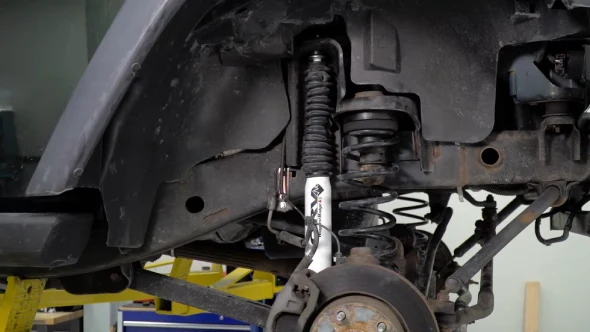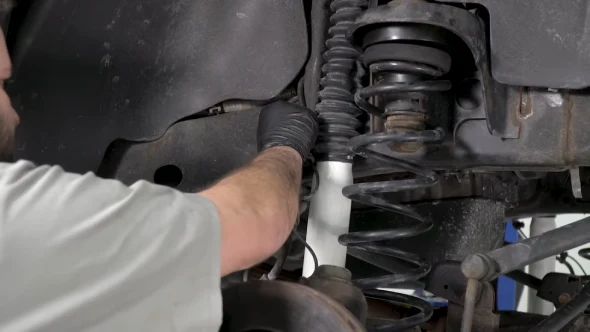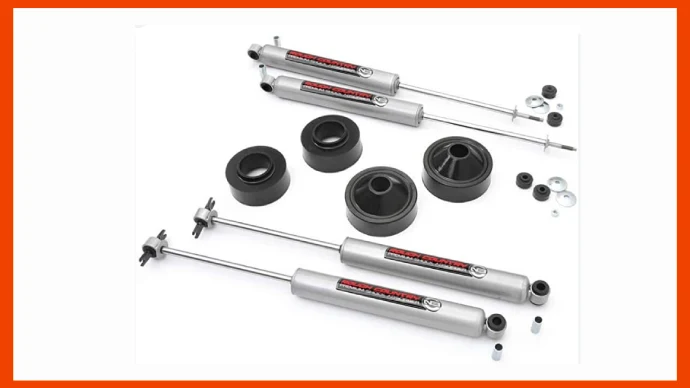Last Updated on March 19, 2023
Are you installing a 1.75-inch lift kit on your truck? It’s an excellent choice, but you may wonder if you must simultaneously replace the shocks. After all, a lift kit puts more strain on the suspension than usual, so it’s important to have components that can handle it.
When deciding whether you need new shocks for the 1.75 lift kit, the answer isn’t always clear. This is due to a number of factors including the type of lift kit you are using, the condition of the existing shock absorbers, and the weight of your SUVs, Jeeps, or other vehicles.
Also, your driving style and desired performance level, budget, and possible brand compatibility issues need to be considered. So, without wasting any time, you should read this quick guide to learn about 1.75 lift kits and shocks.
How Do You Need New Shocks for 1.75 Lift Kit: Easy Steps

To determine whether a 1.75-inch lift kit requires new shocks, here are some key factors to look at that can help you determine what you need:
01: Lift Kit Type
When installing a 1.75-inch lift kit, it is crucial to consider the type of lift kit before determining if you need new shocks. For example, if the lift kit includes extended shocks, you may not need to replace your existing shocks.
But, if the kit does not include extended shocks, then new shocks may be necessary to ensure your vehicle’s suspension system can handle the increased height.
Also, consulting with an expert or researching different types of lifts is essential to ensure that you use the appropriate one for your vehicle and driving habits.
02: Existing Shock Condition
When determining whether or not new shocks may be needed for a 1.75-inch lift kit installation, it is vital to assess your current shock condition as well.
If they are worn or damaged in any way, then replacing them before installing the lift kit may be advisable to get the most out of your suspension system.
Also, considering how old they are can provide helpful information; depending on their age and mileage, they could require replacement regardless of a lift installation.
03: Vehicle Weight
The weight of your vehicle can also play a role in determining whether new shocks are necessary for a 1.75-inch lift kit installation.
Heavy vehicles like pickup trucks may require more durable shocks to handle the increased weight and terrain changes without damaging components.
You should consult an expert specializing in off-road suspensions before deciding on shock selection and installation.
04: Driving Style
Another factor to consider when deciding whether or not new shocks are required is driving style. Getting special shocks is a good idea if you drive on bumpy or rough roads.
These shocks will last longer and won’t wear out as quickly because they can handle harder roads better than regular shocks.
05: Desired Performance
If you have a 1.75-inch lift kit installed and want improved handling or a smoother ride, replacing your shocks may be necessary.
Shocks play an essential role in the performance of your suspension system and are responsible for damping out road irregularities and providing stability during corners.
If you have upgraded your lift kit but not replaced your shocks, then they may no longer be able to provide the necessary dampening to improve performance.
You should also consider if the current shocks have exceeded their service life; most manufacturers recommend replacing shocks every 50,000 miles or five years, whichever comes first.
06: Upgrading Your Shocks Can Be Expensive
If you are upgrading your shocks to accommodate a 1.75-inch lift kit, it is vital to consider the cost of replacement parts before making any decisions. Shock’s price depends on the make and model, so it is crucial to determine how much money needs to be budgeted for replacement parts.
Also, depending on your vehicle’s make and model, you may need more than one set of shock absorbers. This will also increase the overall cost of replacement parts and installation labor costs.
But remember that even though replacing your shocks can be expensive up front, they will pay off in improved handling and comfort over time.
07: Brand Compatibility
When replacing your shocks for a 1.75-inch suspension lift kit, it is essential to make sure that they are compatible with other suspension components to ensure proper performance and safety.
Many lift kit manufacturers will recommend specific shock absorber brands or models to guarantee compatibility with existing components such as springs and control arms.
Also, some vehicles require a custom-fit shock absorber due to design differences between different makes and models. These must be purchased from aftermarket suppliers instead of OEM part dealers, as they are typically unavailable through regular channels.
08: Suspension Travel
The additional 1.75-inch lift provided by installing a lift kit may require longer shock absorbers to provide sufficient suspension travel without causing damage to other components, such as control arms or springs, due to over-traveling the suspension system’s maximum travel distance.
Longer shocks will provide increased damping capability during compression strokes while limiting rebound strokes which can cause damage due to increased suspension travel beyond its designed limit.
If you plan to drive your vehicle off-road, upgrade your shock absorbers. This will help protect them from the extra stress of rough terrain and make sure that they don’t get worn out too quickly.
Does a 1.75″ Lift Kit Mess Up Your Truck Shocks?

Adding a body leveling lift kit can change the center of gravity of your truck, which can affect how a vehicle handles when turning corners or taking curves.
The lift kit itself does not have any serious impact on the suspension system, but it could cause instability and make the ride rougher. It’s important to consider the overall weight balance of a vehicle when installing any lift kits.
Will a 1.75″ Lift Kit with New Shocks Make My Truck Ride Rough?
It depends on how much additional weight you place on the vehicle and its suspension system.
Generally speaking, adding larger shocks or stiffer suspension will result in a rougher ride due to additional strain being placed on the components. But, with proper tuning, you may be able to mitigate this effect and make your ride smoother.
How Do I Make My 1.75″ Lifted Truck Ride Smoother?
Several steps can be taken to improve the ride quality of your lifted truck, including reducing unsprung mass, softening up the suspension system, changing wheels and tires, modifying the chassis, eliminating vibrations, and replacing leaf springs if necessary.
Proper tuning and adjustments can improve cornering stability while making for a smoother ride experience.
Will a 1.75″ Leveling Kit with New Shocks Hurt Ride Quality?

Installing a 1.75″ leveling kit with reliable new shocks won’t reduce ride quality when done correctly. Poor installation or purchasing cheap components can lead to negative effects on handling as well as ride comfort.
But getting a high-quality lift kit and relying on professional technicians will ensure your vehicle’s performance remains unaffected after installation.
Know Before Investing in New Shocks for Your 1.75-inch Lift Kit
Whether or not you need new shocks for your 1.75-inch lift kit depends on several factors, such as the type of lift kit, the existing shock condition, vehicle weight, driving style, desired performance level, budget considerations, and brand compatibility.
Taking these factors into account will ensure that your vehicle is able to handle the extra height from the lift kit safely and efficiently. Installing upgraded shocks can also provide enhanced performance, handling, and durability so it may be worth considering investing in high-quality shocks if possible.
By understanding these key points before investing in a new set of shocks for your 1.75-inch lift kit, you can make an educated decision that meets all of your needs.
